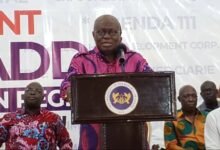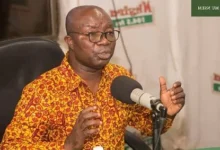At the C’ssion of Inquiry: Let’s fight vigilantism …IGP urges Ghanaians
The Inspector General of Police (IGP), David Asante-Apeatu has disclosed that he had no prior knowledge of the covert operation by The National Security at the Ayawaso West Wuogon Constituency on January 31.
“No, my Lord. I did not know about it,” was the IGP’s response when the Commission of Inquiry on the Ayawaso West Wuogon Constituency by-election violence quizzed him yesterday whether he, a member of the National Security Council, was informed before the operation was undertaken.
The operation which was to be executed by a team of 25 Special Weapons and Tactics(SWAT) Unit and 35 civilian securityoperatives, according to National Security officials, was sanctioned after they gathered intelligence that some persons were stockpiling weapons at the house of the National Democratic Congress (NDC) parliamentary candidate, Delali Brempong at La-Bawaleshie.
If it had been brought to the attention of the Ghana Police Service, Mr Asante-Apeatu said the police was well trained and equipped to effectivelycarry out the operation and deal with any incidence that may arise.
Asked why the operatives resorted to brutalities rather than protecting the lives and properties, he noted that he was not abreast with the capabilities of the National Security SWAT team.
In the Police Service however, the IGP stated that minimum force was allowed to address problems and when a gunshot was fired, the officer responsible is made to account for it.
“Our service instructions enjoin us not to use torture or violence to solve problems. We can use minimum force when it is necessary. When there is a mob and shots must be fired, our service instructions state that the shots must be at the knees of the mob leaders. Any officer who fires or gives command for a firearm should know that he will account for that,” he noted.
He confirmed earlier report that the incident recorded during the by-election was currently under investigation stating that all the weapons that were taken to Ayawaso would be examined to know the type of weapons that were fired.
On the possibility of officers seconded to the National Security being used for unlawful operations, Mr Asante-Apeatu, said, he was confident the national security was operating within the laws of Ghana and that disciplinary actions were taken when anything untoward was reported.
On vigilantism, he said it was difficult for the Police to process cases of vigilantism either within the parties or between the parties because approach by witnesses to the case changes all of a sudden.
However, he stated that there was proof that the police responds to all reported cases according to the dictates of the Police profession and bemoaned meagre punishment handed down to culprits by the courts.
If a complaint was lodged at a police station, the IGP said, the police was duty bound to respond, conduct investigations and ensure that the culpable one was prosecuted, adding, that any officer who fails to do this was liable to disciplinary action.
Addressing concerns that the Ghana Police Service was politicised, the IGP explained that it was a global phenomenon that the leadership of Police units was subject to change when government changes hands, adding, that any officer victimised for engaging in his or her duty should petition the Police Council or seek redress from the court.
On fears by some officers that they would be transferred or would not be promoted if their actions go against the ruling government, he said transfers were to be expected by all officers because they were being paid to ensure security in the whole of the country.
Mr Asante-Apeatu further noted that the Commission has unearthed several things that must be given serious attention by the security agencies.
“The Commission of Inquiry has brought forth so many lessons that we are learning from.”
BY CLAUDE NYARKO ADAMS








